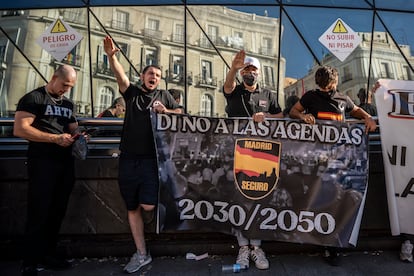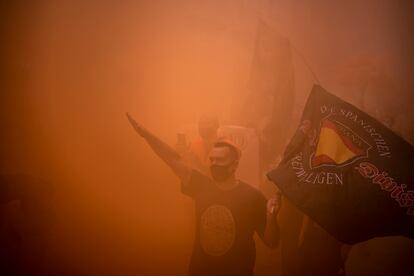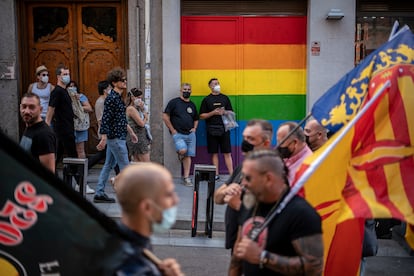Neo-Nazi march against LGBTQ+ community in Madrid raises alarm over growing homophobia
Regional prosecutors have launched an investigation into potential hate crimes while politicians have criticized premier Isabel Díaz Ayuso for downplaying the problem

A neo-Nazi march in Madrid has created concern over the rise of homophobia in Spain. Around 200 people gathered on Saturday in the gay-friendly neighborhood of Chueca, known as the center of Spain’s annual Pride celebrations, where they shouted insults such as “get fags out of our neighborhood” and “get those sidosos [AIDS-ridden people] out of Madrid,” as they marched toward the city’s landmark Puerta del Sol square.
Prosecutors in Madrid have launched an investigation into potential hate crimes and have requested reports from the police and from the government delegation in the region.
During the two-hour demonstration, the group set off flares, carried signs with far-right symbols and expressed their contempt for unaccompanied migrant minors and migrants more broadly. The participants – who were escorted by riot police and several National Police vans – also waved Spanish flags and symbols of Juventud Nacional (National Youth), an organization linked to the far-right party España 2000 (Spain 2000).

As well as the homophobic chants, demonstrators yelled “Here are the nationalists,” a reference to those who supported dictator Francisco Franco during the Spanish Civil War (1936-1939). One person was arrested for “assaulting another protester,” according to Inmaculada Sanz, the spokesperson for Madrid City Hall.
The march was organized by the San Blas-Canillejas Association under the banner “Say No to the 2030-2050 Agenda,” in reference to the Spanish government’s planned reforms in education, healthcare, taxes, jobs, pensions and the environment over the next three decades. In an image to promote the event on social media, the organizers described these reforms as “an attack on the culture and identity of the people of Spain.”
But while the demonstration was organized under this banner, it had nothing to do with these issues. Sources from the central government’s delegation in Madrid said it had authorized the demonstration on the understanding it was an anti-government march, not a homophobic, neo-Nazi protest.
Equality Minister Irene Montero, from the leftist Unidas Podemos, wrote via Twitter on Sunday that she would take legal action against the organizers, adding that the central government – a coalition of the Socialist Party (PSOE) and her own party – is finalizing the so-called ”Trans Law” to protect the rights of the LGBTQ+ community.

The march comes amid growing concern over homophobia in Spain. According to the observatory, there have been 103 homophobic assaults so far this year in Madrid. Despite this, the premier of the Madrid region, Isabel Díaz Ayuso, of the conservative Popular Party (PP), which appealed the same-sex marriage law introduced in 2005, said last week that “homophobia is inside the head of the [political] left.”
Ayuso also indicated that she is open to reviewing the regional law against homophobia, which was approved by the previous PP administration in 2016. This is a demand of the far-right party Vox, on whose votes the PP relies on to pass key legislation.
In condemning the neo-Nazi demonstration, many politicians criticized the premier’s soft stance on homophobia. Carolina Darias, the spokesperson of Unidas Podemos in the Madrid regional assembly, said the march “refutes the words of Ayuso who said at the last meeting that there was no hate speech in Madrid and that it was an invention of the left to annoy her.”
Rita Maestre, the spokesperson of the leftist Más Madrid party, also accused the PP of “denying the existence of hate speech,” while Santiago Rivero, a regional deputy from the PSOE and LGBTQ+ rights activist, added: “Ayuso said that Madrid is a region free of LGBTQ-phobia and that is not true, because we keep seeing how a social minority continues to consider us inferior and continues to insult us and attack us on the street.”

“The parsimony of institutions, far from fighting this hate speech, protects it and legitimizes it, putting at risk social harmony and even the safety of the LGBTQ+ community,” said Álvaro Aguilera, the coordinator of the Madrid branch of Izquierda Unida (United Left).
Vox leader Santiago Abascal, meanwhile, described the protesters as a “group of crazy people and fanatics” and said the demonstration “stank of the Socialist sewers,” suggesting that the protest had somehow been arranged by the party.
Figures from the Interior Ministry reflect that, in the first six months of this year, the police and Civil Guard have received 610 reports related to hate crimes, which is 9.3% up on the same period in 2019, when there were 558 – a previous record since these statistics began to be tracked in 2014. A recent survey carried out by the same ministry revealed that just one in 10 people who suffer a hate crime report it to the police.
In June, a 24-year-old nurse named Samuel Luiz was beaten to death in the Galician city of A Coruña in a suspected homophobic attack.
English version by Melissa Kitson.
Tu suscripción se está usando en otro dispositivo
¿Quieres añadir otro usuario a tu suscripción?
Si continúas leyendo en este dispositivo, no se podrá leer en el otro.
FlechaTu suscripción se está usando en otro dispositivo y solo puedes acceder a EL PAÍS desde un dispositivo a la vez.
Si quieres compartir tu cuenta, cambia tu suscripción a la modalidad Premium, así podrás añadir otro usuario. Cada uno accederá con su propia cuenta de email, lo que os permitirá personalizar vuestra experiencia en EL PAÍS.
¿Tienes una suscripción de empresa? Accede aquí para contratar más cuentas.
En el caso de no saber quién está usando tu cuenta, te recomendamos cambiar tu contraseña aquí.
Si decides continuar compartiendo tu cuenta, este mensaje se mostrará en tu dispositivo y en el de la otra persona que está usando tu cuenta de forma indefinida, afectando a tu experiencia de lectura. Puedes consultar aquí los términos y condiciones de la suscripción digital.








































